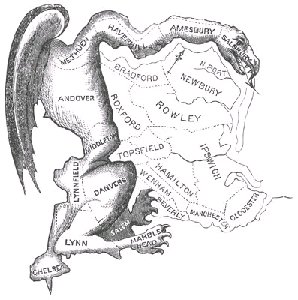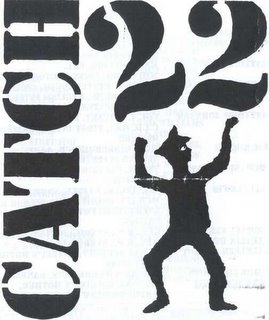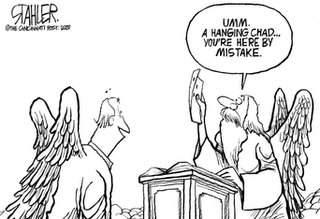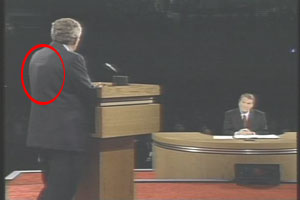A Manifesto For Government Reform
A Few BIG Problems
There are a myriad of problems with our legislative and electoral system and some of them (like the electoral college) are unlikely to be fixed anytime soon. However, I've isolated 3 or 4 big problems that would be relatively easy to fix, moving us a long way toward taking money, fraud, voter apathy and disproportionate representation out of national politics.
Problem #1: Redistricting Redux
One of the biggest and easiest-to-fix problems in our political system is the fact that the electoral process, for reasons so obvious they don’t bear outlining, should be completely bipartisan, fair and unbiased. If you are like me, you probably naively thought it was - until the 2000 election made us all instant experts on just how partisan, party-driven and inconsistent the whole process of electing our leaders really is. A feature of many U.S. electoral maps has been the gerrymander: electoral districts drawn, sometimes ludicrously, to favor one party over another. This is a defect in the electoral system that both parties have taken advantage of. Gerrymandering is hardly new, I've included a cartoon that pokes fun of the ridiculously serpentine district map of Massachusetts in 1812.
 Over the past 8-10 years, Republicans have reaped the benefits of partisan redistricting on the national level, winning consistent majorities in congress and two successive terms in the White House. On more local levels, partisan redistricting has allowed many states, counties and municipalities to keep one party in power for generations. Earlier this month both California and Ohio had hugely unsuccessful election reform initiatives to make the drawing of district maps more bipartisan. This doesn’t bode well for future reforms in this area but stay tuned. The fact that this previously obscure topic is now in the forefront of national consciousness is a very positive sign. Here the fix itself is pretty easy, its actually getting it implemented that is the real challenge.
Over the past 8-10 years, Republicans have reaped the benefits of partisan redistricting on the national level, winning consistent majorities in congress and two successive terms in the White House. On more local levels, partisan redistricting has allowed many states, counties and municipalities to keep one party in power for generations. Earlier this month both California and Ohio had hugely unsuccessful election reform initiatives to make the drawing of district maps more bipartisan. This doesn’t bode well for future reforms in this area but stay tuned. The fact that this previously obscure topic is now in the forefront of national consciousness is a very positive sign. Here the fix itself is pretty easy, its actually getting it implemented that is the real challenge.
Problem #2: Good Old Influence Peddling
 Money has always been the grease the moves the wheels in politics. However, the blatant corruption and level of congressional dancing on the fine line of ethical misconduct is reaching a point not achieved since the Democrats maintained majorities in both houses. Goes to show that corruption is about the only bipartisan phenomenon in Washington. What to do, what to do? Here we can take a page from the conveniently recent and numerous corporate scandals. One of the things they have reminded us is that all the laws in the world aren’t going to change things if no one follows those laws to begin with. Corruption is, by definition, a flouting of laws. It is especially unsavory when the lawbreakers are the very people who write them in the first place. The answer here is less obvious but no less simple. Clearly, corruption begets corruption. In any organization, individuals are going to take their ethical cues from everyone else around them. If you are driving on the highway and everyone is going 65 mph you are far less likely to speed than if everyone is driving 90 mph. It is for this reason that I put much of the blame on the Bush Administration and the Republican majority in congress. Now I know that Democrats have an equally pathetic ethical track record but they are not currently the party in power. Yes, Wright, Rostenkowski and their cronies were the Tom DeLays and Bill Frists of their day, but the Democrats aren’t running the show right now, the Republican’s are. If you want marquee billing you’re going to have to accept responsibility when the critics pan you in Washington Follies. Since Republicans control three houses, they are the ones who must set the tone for what is tolerated in Washington. Beginning with the obscene election of 2000 it’s been “anything goes” in the ethics department ever since. Unlike redistricting however, this is a problem that the system will most likely remedy on its own when a truly rip-roaring angry electorate throws the incumbent Congress out of office, en mass.
Money has always been the grease the moves the wheels in politics. However, the blatant corruption and level of congressional dancing on the fine line of ethical misconduct is reaching a point not achieved since the Democrats maintained majorities in both houses. Goes to show that corruption is about the only bipartisan phenomenon in Washington. What to do, what to do? Here we can take a page from the conveniently recent and numerous corporate scandals. One of the things they have reminded us is that all the laws in the world aren’t going to change things if no one follows those laws to begin with. Corruption is, by definition, a flouting of laws. It is especially unsavory when the lawbreakers are the very people who write them in the first place. The answer here is less obvious but no less simple. Clearly, corruption begets corruption. In any organization, individuals are going to take their ethical cues from everyone else around them. If you are driving on the highway and everyone is going 65 mph you are far less likely to speed than if everyone is driving 90 mph. It is for this reason that I put much of the blame on the Bush Administration and the Republican majority in congress. Now I know that Democrats have an equally pathetic ethical track record but they are not currently the party in power. Yes, Wright, Rostenkowski and their cronies were the Tom DeLays and Bill Frists of their day, but the Democrats aren’t running the show right now, the Republican’s are. If you want marquee billing you’re going to have to accept responsibility when the critics pan you in Washington Follies. Since Republicans control three houses, they are the ones who must set the tone for what is tolerated in Washington. Beginning with the obscene election of 2000 it’s been “anything goes” in the ethics department ever since. Unlike redistricting however, this is a problem that the system will most likely remedy on its own when a truly rip-roaring angry electorate throws the incumbent Congress out of office, en mass.
 That being said, lobbyists are out of control and desperately need to be reigned in while still allowing constituencies to have fair and equal access to members of Congress. The concept of lobbying is a good one. However, well-heeled lobbyists shouldn’t have better access than anyone else. If anything, lobbyist access should be based on proportional representation and the size of the constituencies they represent, not the number of perks they throw at legislators. A better effort needs to be made to remove big money from the political process. When drilling in Alaska (something that polls have shown a huge majority is against) becomes a likely political outcome simply because those in favor are deep-pocketed corporations; you know the current system isn’t working. In fact, in the current money-driven system, when individual interests go up against corporate interests, big business is going to win every single time. So the simple prescription is to make tougher laws (something Congress wants us to think it’s really good at) and increase oversight of both lobbyists and legislators. The current laissez-faire or “hands off” philosophy of government clearly doesn’t work. Contrary to what conservatives would like us to think, government oversight is necessary and probably one of the only areas of government that has actually gotten smaller under George W. Bush.
That being said, lobbyists are out of control and desperately need to be reigned in while still allowing constituencies to have fair and equal access to members of Congress. The concept of lobbying is a good one. However, well-heeled lobbyists shouldn’t have better access than anyone else. If anything, lobbyist access should be based on proportional representation and the size of the constituencies they represent, not the number of perks they throw at legislators. A better effort needs to be made to remove big money from the political process. When drilling in Alaska (something that polls have shown a huge majority is against) becomes a likely political outcome simply because those in favor are deep-pocketed corporations; you know the current system isn’t working. In fact, in the current money-driven system, when individual interests go up against corporate interests, big business is going to win every single time. So the simple prescription is to make tougher laws (something Congress wants us to think it’s really good at) and increase oversight of both lobbyists and legislators. The current laissez-faire or “hands off” philosophy of government clearly doesn’t work. Contrary to what conservatives would like us to think, government oversight is necessary and probably one of the only areas of government that has actually gotten smaller under George W. Bush.

So why are we electing people to write our laws who clearly have nothing but contempt for them? This is the catch-22. We are doing so because the system is broken. But we can’t fix the system until our election process better reflects the will of the people. But our election process won’t reflect the will of the people until we fix it. And that, my friends, is the lovely little quandary our democracy is in.
Problem #3: The Hanging Chad

We all remember the hanging chads. That iconic symbol of just how archaic, unfair and broken our electoral system was (and still is). We all know most of the issues here and I won’t waste bits and bytes rehashing them all. What I will say is that electronic voting is light-years ahead of paper punch. However, as any company that has migrated from paper filing to computer systems will tell you, it ‘ain’t a no-brainer. There are a myriad of problems when a paper ballot become a series of bits on a hard drive. A couple of these problems include outsourcing the development and monitoring of electronic voting systems, or administrators who don’t understand the programs and how the systems work. The process by which contracts for computer voting systems are awarded is an area that, left unchecked, is ripe for abuse. How are recounts administered? Should we supply voters with paper printouts? Fraud is much easier when one moves from the paper world to the cyber world. Ideally, election reform should actually fix the system rather than breaking it further. People joked after the last presidential election that Diebold, longtime Bush contributors, "programmed" their electronic voting machines such that all votes were fed to Karl Rove’s laptop computer.

(By the way, did we ever figure out whether Dubya was wired for audio assistance during the second presidential debate?)

Hopefully, the Diebold joke was just that but it does, at an extreme, highlight the potential for abuse and the ease of computerized vote tampering. Regardless, I think that getting rid of hanging chads is a good start.More importantly, we should develop a national “Voter’s Bill of Rights”. This should include better-trained and more closely monitored poll volunteers, as well as easier access for elderly, handicapped and others who need assistance getting to polling stations. And by all means, relatively short wait times for all voters. Local election commissions should be held accountable if they overly restrict the access of “certain” voters, engage in outright voter intimidation, or create unreasonably long lines at “certain” polling locations. We can pretty much all agree that these things are inexcusable but in reality there have been few negative consequences for those who undermine the election process. Now I realize many localities are financially strapped and for this reason, are not able to accommodate large numbers of voters. It is for this reason that the way we fund the voting process needs to change. I’m not sure there is an easy answer to this problem but perhaps we should take some of the obscene amounts of money currently lining the coffers of the candidates and funnel some of it to pay for the election process itself, so that ALL districts can afford to properly plan, manage, and monitor their polling places. We have to send the message that anything less than free and fair voting for all will not be tolerated. If Fedex can manage to deliver a letter anywhere in the world in less than 24 hours and do it every day of the year – than all citizen, regardless of race, locality or socioeconomic status, should be able to cast a vote within an hour, one day out of 730.
Problem #4: Party Hack ≠ Election Commissioner
 .....................The Face That Launched a Reform Movement
.....................The Face That Launched a Reform Movement
We all remember Katherine Harris, Hanging Chad’s good friend and the other iconic symbol of Election 2000 Republican Party hackery. She infiltrated and perverted Florida’s election process in the most sublime and unscrupulous manner imaginable. She did everything possible to prevent a recount short of personally shredding the ballots herself. “Never again!” are the words that spring to mind when I think of old Wicked Witch of the South. Yet incredibly, party chairs continue to assume the roles of Election Commissioners, Secretaries of State and Certifiers of Ballots (remember Ohio ’04?). This, unlike computer voting machines IS a no brainer. Remove party hacks from the election process altogether and do it YESTERDAY. Give states leeway in how they want to conduct state and local elections but for national elections all states should maintain relative consistency of the electoral process. Although it has been the idea du jour since 9/11, a cabinet level non-partisan Department of Elections may not be such a bad idea. Something akin to the non-political Federal Reserve although without presidential appointment, having instead, perhaps a bipartisan board with equal party representation. This department would be tasked with instituting all manner of election reforms and oversight. This body would be to the election process what the SEC has so successfully been to the process of underwriting, issuing and trading securities.
Just a Couple Constitutional Amendments
So that’s my two cents on election and lobbying reform. Will it happen? I doubt it but we’ve begun the conversation and that’s a start. So with that, I will leave you with two other electoral reform ideas. Both are, I admit, pipe dreams that I never expect to come to fruition but who knows? Pipe dream number one is getting rid of the Electoral College. Everyone seems to think they know what the Founding Fathers “intended” (and I frankly cringe every time I hear it) but I truly believe that if the old dudes could witness our current election process they would agree the Electoral College has outlived its usefulness (if it ever had any) and needs to go! Sorry Sam Alito, I’m a “one person, one vote” kinda guy. It is patently unfair that urban regions, who pay far more of the tax revenues it takes to run the country, should be further abused by a vote apportioning system that is rigged against them. Under the Electoral College, rural voters get somewhere on the order of two votes to every one urban vote. It is condescending and arrogant to think that we don’t all know who benefits from this lopsided equation. Having an election process, which the majority of voters perceive as unfair, undermines the integrity of the whole system. The result is voter apathy, which compounds the problem of disproportionate representation. Those with votes that count as double will go to the polls while those with votes that count less will stay home. This will only last for so long. Sooner or later, if we don’t fix this someone smarter and decidedly less conservative than Karl Rove will find their own way to get around the Electoral College.
Finally, forget the marriage amendment, we should amend the Constitution such that U.S. citizens no longer have a right to vote but an obligation to do so. In other words, you want to live here, you have to get up off your fat ass once every two years and go vote. I see it as a small price to pay for liberty. And if you don’t meet your constitutional obligation to vote, you have to pay a fine, get deported, or listen to Celine Dion non-stop for a week. I guess the latter punishment would violate that darn “cruel and unusual” clause though wouldn’t it? Oh well, if we’re only dreaming what’s one more constitutional amendment?